The Intel Kaby Lake-X i7 7740X and i5 7640X Review: The New Single-Threaded Champion, OC to 5GHz
by Ian Cutress on July 24, 2017 8:30 AM EST- Posted in
- CPUs
- Intel
- Kaby Lake
- X299
- Basin Falls
- Kaby Lake-X
- i7-7740X
- i5-7640X
Benchmarking Performance: CPU Encoding Tests
One of the interesting elements on modern processors is encoding performance. This includes encryption/decryption, as well as video transcoding from one video format to another. In the encrypt/decrypt scenario, this remains pertinent to on-the-fly encryption of sensitive data - a process by which more modern devices are leaning to for software security. Video transcoding as a tool to adjust the quality, file size and resolution of a video file has boomed in recent years, such as providing the optimum video for devices before consumption, or for game streamers who are wanting to upload the output from their video camera in real-time. As we move into live 3D video, this task will only get more strenuous, and it turns out that the performance of certain algorithms is a function of the input/output of the content.
All of our benchmark results can also be found in our benchmark engine, Bench.
7-Zip 9.2: link
One of the freeware compression tools that offers good scaling performance between processors is 7-Zip. It runs under an open-source licence, is fast, and easy to use tool for power users. We run the benchmark mode via the command line for four loops and take the output score.
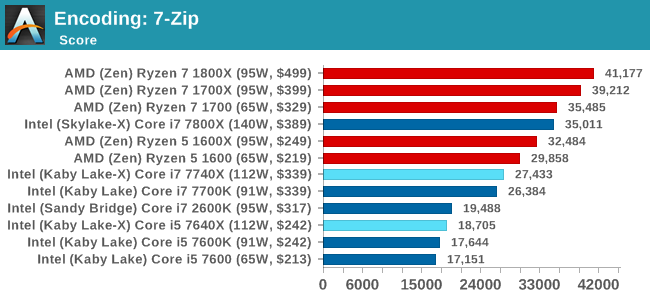
7z loves threads. 7z loves it.
WinRAR 5.40: link
For the 2017 test suite, we move to the latest version of WinRAR in our compression test. WinRAR in some quarters is more user-friendly that 7-Zip, hence its inclusion. Rather than use a benchmark mode as we did with 7-Zip, here we take a set of files representative of a generic stack (33 video files in 1.37 GB, 2834 smaller website files in 370 folders in 150 MB) of compressible and incompressible formats. The results shown are the time taken to encode the file. Due to DRAM caching, we run the test 10 times and take the average of the last five runs when the benchmark is in a steady state.
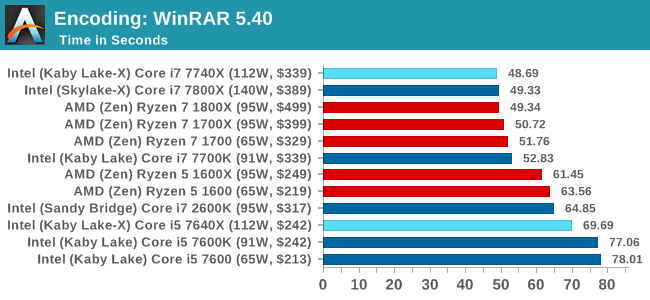
WinRAR is another benchmark like Agisoft, with some parts being serial and others multithreaded. When we compare the Core i7 to the Ryzen 7, the high ST performance helps push the Core i7 to the top despite the 2:1 thread deficit. On the other hand, the Core i5 has a 3:1 thread defecit to the Ryzen 5, and falls beneath it in the results.
AES Encoding
Algorithms using AES coding have spread far and wide as a ubiquitous tool for encryption. Again, this is another CPU limited test, and modern CPUs have special AES pathways to accelerate their performance. We often see scaling in both frequency and cores with this benchmark. We use the latest version of TrueCrypt and run its benchmark mode over 1GB of in-DRAM data. Results shown are the GB/s average of encryption and decryption.
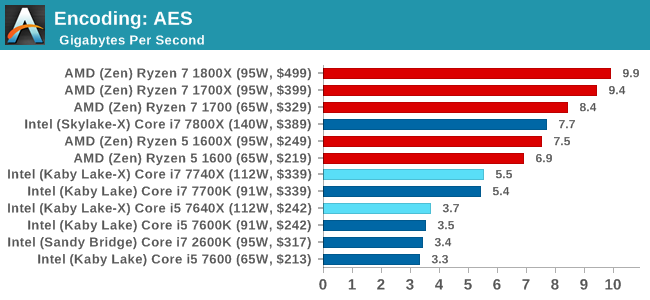
AES is an optimized problem for modern processors, so add frequency and cores to get a proportionally better result. Again, the Core i7-2600K and the Core i5-7640X are almost neck-and-neck.
HandBrake v1.0.2 H264 and HEVC: link
As mentioned above, video transcoding (both encode and decode) is a hot topic in performance metrics as more and more content is being created. First consideration is the standard in which the video is encoded, which can be lossless or lossy, trade performance for file-size, trade quality for file-size, or all of the above can increase encoding rates to help accelerate decoding rates. Alongside Google's favorite codec, VP9, there are two others that are taking hold: H264, the older codec, is practically everywhere and is designed to be optimized for 1080p video, and HEVC (or H265) that is aimed to provide the same quality as H264 but at a lower file-size (or better quality for the same size). HEVC is important as 4K is streamed over the air, meaning less bits need to be transferred for the same quality content.
Handbrake is a favored tool for transcoding, and so our test regime takes care of three areas.
Low Quality/Resolution H264: He we transcode a 640x266 H264 rip of a 2 hour film, and change the encoding from Main profile to High profile, using the very-fast preset.
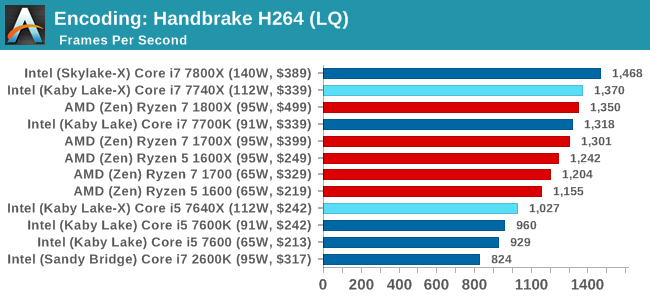
High Quality/Resolution H264: A similar test, but this time we take a ten-minute double 4K (3840x4320) file running at 60 Hz and transcode from Main to High, using the very-fast preset.
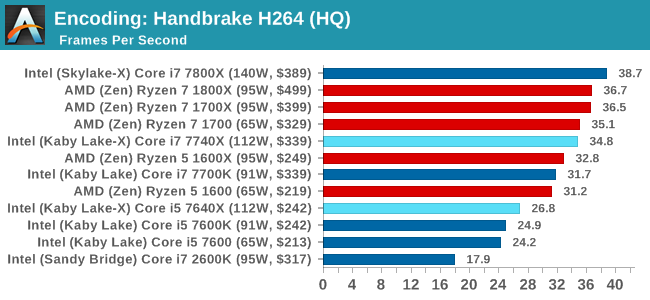
HEVC Test: Using the same video in HQ, we change the resolution and codec of the original video from 4K60 in H264 into 4K60 HEVC.
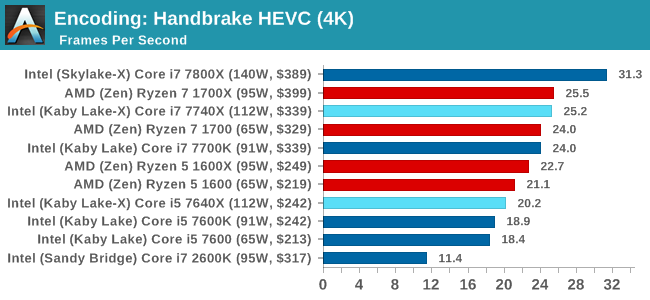










176 Comments
View All Comments
MTEK - Monday, July 24, 2017 - link
Random amusement: Sandy Bridge got 1st place in the Shadow of Mordor bench w/ a GTX 1060.shabby - Monday, July 24, 2017 - link
That's funny and sad at the same time unfortunately.mapesdhs - Monday, July 24, 2017 - link
S'why I love my 5GHz 2700K (daily system). And the other one (gaming PC). And the third (benchmarking rig), the two I've sold to companies, another built for a friend, another set aside to sell, another on a shelf awaiting setup... :D 5GHz every time. M4E, TRUE, one fan, 5 mins, done.GeorgeH - Monday, July 24, 2017 - link
Those decreased overclocking performance numbers aren't just red flags, they're blinding red flashing lights with the power of a thousand suns.Seriously, that should have been the entire article - this platform is a disaster if it loses performance under sustained load. That's not hyperbole, it's cold hard truth. Sustained load is part of what HEDT is about, and with X299 you're spending more money for significantly less performance?
I sincerely hope you're going to get to the bottom of this and not just shrug and let it slide away as a mystery. Hopefully it's just platform immaturity that gets ironed out, but at the present time I have absolutely no clue how you could recommend X299 in any way. Significantly less sustained performance is a do not pass go, do not collect $200, turn the car around, oh hell no, all caps showstopper.
deathBOB - Monday, July 24, 2017 - link
But they're big AVX workloads. We know heat and power get a bit crazy with the AVX, and at some point we should just step back and realize that overclocking may not be appropriate for these workloads.GeorgeH - Monday, July 24, 2017 - link
But other AVX workloads didn't have the issue.Until we know exactly what is going on and what will be required to fix it, I can't comprehend how anyone can regard X299, at least with the quad core CPUs, as anything but "Nope". Maybe a BIOS update will help, or tuning the overclock, but maybe it'll require new motherboard revisions or delidding the CPU. I'm sure it'll get fixed/understood at some point, but for now recommending this platform is really hard to accept as a good idea.
MrSpadge - Monday, July 24, 2017 - link
> But other AVX workloads didn't have the issue.Using a few of those instructions is different from hammering the CPU with them. Not sure what this software does, but this could easily explain it.
Icehawk - Monday, July 24, 2017 - link
I do a lot of Handbrake encoding to HEVC which will peg all cores on my O/C'd 3770, it uses AVX but obviously a much older version with less functionality, and I can have it going indefinitely without issue.I've looked at the 7800\7820 as an upgrade but if they cannot sustain performance with a reasonable cooling setup then there is no point. The KBL-X parts don't offer enough of a performance improvement to be worth the cost of the X299 mobo which also seem to be having teething problems.
Future proofing is laughable, let's say you bought a 7740x today with the thought of upgrading in two years to a higher core count proc - how likely is it that your motherboard and the new proc will have the same pinout? History says it ain't happening at Camp Intel.
At this point I'm giving a hard pass to this generation of Intel products and hope that v2 will fix these issues. By then AMD may have come close enough in ST performance where I would consider them again, I really want the best ST & MT performance I can get in the $350 CPU zone which has traditionally been the top i7. AMD's MT performance almost tempts me to just build an encoding box.
I loved my Athlon back in the day, anyone remember Golden Fingers? :D
mapesdhs - Monday, July 24, 2017 - link
Golden Fingers... I had to look that up, blimey! :DDrKlahn - Tuesday, July 25, 2017 - link
I recently went from a 4.6GHz 3770K to a 1700X @ 4GHz at home. I play some older games that don't thread well (WoW being one of them). The Ryzen is at least as fast or faster in those workloads. Run Handbrake or Sony Movie Studio and the Ryzen is MUCH faster. We use built 6 core 5820K stations at work for some users and have recently added Ryzen 1600 stations due to the tremendous cost savings. We have yet to run into any tangible difference between the two platforms.Intel does have a lead in ST, but tests like these emphasize it to the point it seems like a bigger advantage than it is in reality. The only time I could see the premium worth it is if you have a task that needs ST the majority of the time (or a program is simply very poorly optimized for Ryzen). Otherwise AMD is offering an extraordinary value and as you point out AM4 will at least be supported for 2 more spins.